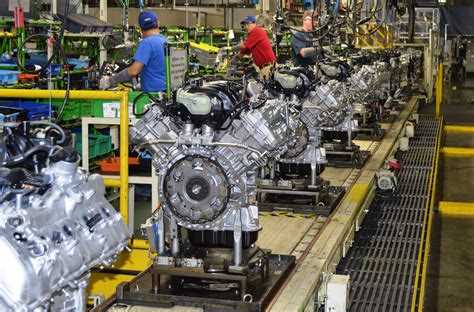
In the competitive world of automobiles, one brand stands out for its groundbreaking innovations and unwavering commitment to excellence – Toyota. With a rich history spanning over several decades, Toyota has proven to be a true game-changer in the automotive industry.
Inspired by a Vision
Toyota’s journey began with a visionary leader who dared to challenge the status quo. Kiichiro Toyoda, the founder of the company, had a clear vision – to create affordable and reliable vehicles that would transform the way people commute. His determination and foresight laid the foundation for Toyota’s remarkable success.
“We will build cars that will enrich people’s lives,” Toyoda declared, setting the stage for a revolution in the industry.
Quality as the Cornerstone
Toyota’s commitment to quality has been a driving force behind its success. Unlike its competitors, Toyota focused on producing vehicles that would not only meet, but exceed customer expectations. This relentless pursuit of excellence led to the development of the Toyota Production System, a revolutionary manufacturing process that minimized waste and maximized efficiency.
“Quality means doing it right when no one is looking.”
With this philosophy at its core, Toyota established a reputation for producing vehicles that were not only reliable but also durable, setting new benchmarks for the industry.
Innovation that Transformed the Industry
To stay ahead of the curve, Toyota embraced innovation like no other. The company introduced groundbreaking technologies that redefined the automotive landscape. From the first mass-produced hybrid vehicle, the Toyota Prius, to advanced safety features like the Toyota Safety Sense, Toyota has consistently pushed the boundaries of what is possible.
“The best way to predict the future is to create it,” said Akio Toyoda, the current President of Toyota, echoing the company’s commitment to innovation.
A Legacy of Sustainable Mobility
In addition to revolutionizing the automotive industry, Toyota has also been a pioneer in promoting sustainable mobility. With the introduction of hydrogen fuel cell vehicles like the Toyota Mirai, the company has taken a bold step towards a greener future. Toyota’s commitment to reducing its environmental impact is evident in its efforts to develop alternative fuel technologies and promote eco-friendly practices.
“We don’t want to just be a car company. We want to be a mobility company,” Toyoda emphasized, highlighting the company’s larger mission to create a sustainable future for all.
Conclusion
Toyota’s relentless pursuit of excellence, commitment to quality, and innovative spirit have revolutionized the automotive industry. From its humble beginnings to its current status as a global leader, Toyota has proven to be a game-changer, setting new standards for the industry. With a legacy built on vision, innovation, and sustainability, Toyota continues to shape the future of mobility and inspire generations to come.
Rise of Toyota: From Humble Beginnings to Global Success
The Story Begins: In the early 1930s, a small Japanese company named Toyota was established by Kiichiro Toyoda. With determination and a vision to revolutionize the automotive industry, Toyoda set out on a journey that would change the world.
Engineering Excellence: Toyota’s success can be attributed to its commitment to engineering excellence. From the very beginning, the company focused on developing innovative technologies and manufacturing processes that would set it apart from its competitors.
Lean Production System: One of Toyota’s most significant contributions to the industry was the development of the lean production system. This revolutionary approach emphasized the elimination of waste, continuous improvement, and employee empowerment, resulting in increased efficiency and productivity.
Quality and Reliability: Toyota became synonymous with quality and reliability, thanks to its relentless pursuit of perfection. The company implemented rigorous quality control measures and established a culture of continuous improvement, ensuring that every Toyota vehicle delivered the highest standards of performance and durability.
Global Expansion: Over the years, Toyota expanded its operations beyond Japan and established a strong presence in international markets. The company’s commitment to customer satisfaction, combined with its ability to adapt to diverse cultural and business environments, propelled its global success.
Environmental Leadership: Toyota has also been at the forefront of environmental leadership in the automotive industry. The company pioneered the development of hybrid electric vehicles and continues to invest in sustainable technologies, aiming to create a greener future for generations to come.
Conclusion: From its humble beginnings to becoming a global powerhouse, Toyota’s rise to success is a testament to its unwavering commitment to innovation, quality, and customer satisfaction. The company’s legacy continues to shape the automotive industry, inspiring others to think differently and create a better future.
Founding of Toyota: A Visionary’s Dream

Toyota, one of the world’s leading automobile manufacturers, has a rich history that traces back to its founding in 1937. The company was established by Kiichiro Toyoda, a visionary entrepreneur with a passion for innovation and a dream to revolutionize the automotive industry.
Driven by his relentless pursuit of excellence, Toyoda embarked on a journey to create a company that would produce high-quality vehicles that were affordable and accessible to all. He envisioned a future where automobiles would not only be a luxury for the wealthy but a necessity for people from all walks of life.
With his pioneering spirit, Toyoda laid the foundation for what would become one of the most respected and influential automotive companies in the world. He fostered a culture of innovation and continuous improvement, which would later become known as the Toyota Way.
The Toyota Way is a set of guiding principles and values that emphasize the importance of customer satisfaction, continuous learning, and respect for people. It is this philosophy that has propelled Toyota to become a global leader in the automotive industry, renowned for its reliability, durability, and fuel efficiency.
Today, Toyota continues to honor the legacy of its founder by pushing the boundaries of automotive technology and sustainability. From hybrid and electric vehicles to autonomous driving systems, Toyota remains at the forefront of innovation, striving to create a better future for mobility.
Early Challenges: Overcoming Obstacles
When Toyota first entered the automotive industry in the 1930s, it faced numerous challenges that required innovative solutions. One of the main obstacles was the limited resources and infrastructure in Japan at the time. However, Toyota’s founder, Kiichiro Toyoda, was determined to overcome these challenges and revolutionize the industry.
One of the key challenges Toyota faced was the lack of skilled labor. To overcome this, the company implemented a rigorous training program for its employees, focusing on quality and efficiency. This helped Toyota develop a highly skilled workforce that was able to produce high-quality vehicles at a faster rate than its competitors.
Another obstacle for Toyota was the scarcity of raw materials, especially during World War II. To address this issue, Toyota adopted a just-in-time manufacturing system, which allowed them to minimize inventory and reduce waste. By only producing what was needed and when it was needed, Toyota was able to optimize its resources and overcome the limitations imposed by the war.
Additionally, Toyota faced challenges in terms of manufacturing processes and technology. However, the company embraced continuous improvement and innovation, with the introduction of the Toyota Production System. This system emphasized teamwork, problem-solving, and efficiency, enabling Toyota to streamline its manufacturing processes and produce vehicles of superior quality.
In summary, Toyota’s early years in the automotive industry were marked by significant challenges. However, through innovative thinking, a commitment to quality, and a focus on efficiency, Toyota was able to overcome these obstacles and establish itself as a game-changer in the industry. The lessons learned during this period continue to shape Toyota’s approach to manufacturing and innovation to this day.
Innovative Production System: The Birth of Toyota Production System
The Toyota Production System (TPS) revolutionized the automotive industry with its innovative approach to production and efficiency. Developed by Toyota Motor Corporation in the 1940s, TPS became a game-changer, setting new standards for manufacturing excellence.
At the heart of the TPS is the concept of Just-in-Time (JIT) production, which aims to eliminate waste and maximize efficiency. Unlike traditional production systems that rely on large inventories of parts and components, TPS focuses on producing only what is needed, when it is needed, and in the exact quantity required.
To achieve this, the TPS emphasizes the importance of continuous improvement and employee involvement. Workers are encouraged to identify and eliminate waste, whether it’s in the form of excess inventory, defects, or unnecessary processes. This culture of continuous improvement, known as kaizen, has become a cornerstone of TPS.
Another key component of TPS is the practice of autonomation, or jidoka, which empowers workers to stop the production line when a defect is detected. By giving workers the authority to address quality issues immediately, TPS ensures that problems are identified and resolved at the source, preventing them from propagating further down the line.
TPS also incorporates the use of visual management tools, such as kanban boards, which provide a visual representation of the production process and inventory levels. This allows workers to easily track and manage production flow, ensuring that materials and components are available when needed.
In summary, the birth of the Toyota Production System revolutionized the automotive industry by introducing innovative concepts such as Just-in-Time production, continuous improvement, autonomous decision-making, and visual management. These principles have not only improved efficiency and quality at Toyota, but have also influenced and inspired countless other companies in their pursuit of excellence.
Toyota’s Impact on the Automotive Industry
Toyota, a Japanese automobile manufacturer, has had a significant impact on the automotive industry since its establishment in 1937. The company’s innovative approach and commitment to quality have revolutionized the way cars are designed, manufactured, and marketed.
One of Toyota’s most notable contributions to the automotive industry is the development of the Toyota Production System (TPS). This revolutionary manufacturing process focuses on eliminating waste and improving efficiency in every aspect of production. By implementing the TPS, Toyota has been able to streamline its operations and reduce costs, ultimately leading to higher-quality vehicles at more affordable prices.
In addition to its manufacturing innovations, Toyota has also prioritized environmental sustainability in its vehicle designs. The company was one of the first to introduce hybrid electric vehicles to the mass market with the launch of the Toyota Prius in 1997. This pioneering move towards eco-friendly transportation has since inspired other automakers to invest in hybrid and electric technologies, significantly reducing carbon emissions and promoting a greener future for the automotive industry.
Toyota’s commitment to safety has also had a profound impact on the automotive industry. The company has been a leader in developing and implementing advanced safety features, such as stability control systems, collision avoidance systems, and adaptive cruise control. By prioritizing safety in its vehicle designs, Toyota has helped to reduce the number of accidents and save countless lives on the road.
Furthermore, Toyota’s business model of continuous improvement and customer satisfaction has set a benchmark for the industry. The company’s emphasis on quality and reliability has built a strong reputation for Toyota vehicles, leading to high customer loyalty and brand trust. As a result, Toyota has consistently been one of the top-selling automotive brands globally.
In conclusion, Toyota’s impact on the automotive industry cannot be overstated. Through its innovative manufacturing processes, commitment to sustainability and safety, and dedication to customer satisfaction, Toyota has revolutionized the way cars are made and driven. The company’s influence can be seen in the widespread adoption of lean manufacturing principles, the shift towards eco-friendly vehicles, and the integration of advanced safety features in modern cars. Toyota’s legacy continues to shape the future of the automotive industry.